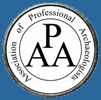-
-
-
-
-
-
-
Indigenous Peoples
-
-
-
-
-
-
-
-
-
-


Indigenous Peoples
We publish information which is accessible to APA members in the Members' Only section that is related to ongoing engagement with Indigenous Peoples and the APA following these guidelines:
Resources Supporting Best Practices in Consultation or Engagement with Indigenous Peoples.
The MTCS Standards and Guidelines for Consultant Archaeologists includes direction on
Aboriginal engagement. As a service to members, the 'Indigenous Contacts' tab in the Members Resources section will list and provide links to a number of documents providing advice on Consultation or Engagement protocols that have been developed by First Nations, Treaty Organizations or Tribal Councils for use by development proponents and government agencies.For the protocols listed, APA will seek confirmation that they have been formally adopted by the concerned First Nations, Treaty Organizations or Tribal Councils. Wherever possible, the listed protocol also includes reference to the Band Council Resolution or motion that formally adopted the protocol. Members are advised to seek current information on engagement directly from the contacts listed.
~~~~~~~~~~~~~~~~~~~~~~~~
Respectful and Reciprocal Communication
The APA encourages personal communication and relationship building with Indigenous peoples about their histories, treaties, stewardship of lands and resources, etc. when collaborating on a research or assessment project. Seek out any relevant archaeological protocols, reach out to consultation staff, and listen to their Elders.
Archaeological Protocols
The APA invites First Nations Communities to share their established archaeological protocols that have been adopted by Chief and Council. To share your Council's protocols with our membership, please alert APA to the existence of your protocols via info@apaontario.ca.
Communities Consultation Point Person
The APA invites First Nations Communities to send their consultation point person's contact information to the APA for posting on our website. Please forward information to APA at this address: info@apaontario.ca. This contact information is only displayed to our APA Members. If you are an APA member, you can login to access this information. If you are not an APA member - please consider joining our association! Note that Consultation Staff are eligible to join APA as a 'First Nation Consultation Staff' member or as an 'Associate' member.
Elders and Traditional Knowledge Keepers
We are fortunate to have access to an ever increasing number of Elders and Traditional Knowledge Keepers through their recordings, publications and speaking engagements. When developing a relationship with a community or nation, ask about their Elders and their nation's traditional knowledge.
As an example, here is a link to hear Gidigaa Migizi (Doug Williams) speak about Treaty 20:
https://www.youtube.com/watch?v=luC8j5qWJlU
Also, there are publishers printing books and making ebooks available, such as ARP Books with their publication of Gidigaa Migizi's Michi Saagiig Nishnaabeg: This is Our Territory.~~~~~~~~~~~~~~~~~~~~~~~~~~~~~~~~~~~~~~~~~~
United Nations Declaration on the Rights of Indigenous Peoples, 2008
Noting, in particular, Article 11:
Article 11
1. Indigenous peoples have the right to practise and revitalize their cultural traditions and customs. This includes the right to maintain, protect and develop the past, present and future manifestations of their cultures, such as archaeological and historical sites, artefacts, designs, ceremonies, technologies and visual and performing arts and literature.
2. States shall provide redress through effective mechanisms, which may include restitution, developed in conjunction with indigenous peoples, with respect to their cultural, intellectual, religious and spiritual property taken without their free, prior and informed consent or in violation of their laws, traditions and customs.
Download the full document: UnitedNationsDeclaration_2008.pdf
~~~~~~~~~~~~~~~~~~~~~~~~~~~~~~~~~~~~~~~~~~
Haida and Taku Supreme Court Decisions, 2004
The 2004 decisions of the Supreme Court of Canada in the Haida and Taku cases have had far reaching effects on Indigenous relations in Canada. Yet few of us know what these decisions were or how they apply or do not apply to our work in archaeology. Follow this link for the actual Supreme Court decisions:
https://scc-csc.lexum.com/scc-csc/scc-csc/en/item/2189/index.do
Among other things, the Supreme Court decided:
Third parties cannot be held liable for failing to discharge the Crown’s duty to consult and accommodate. The honour of the Crown cannot be delegated, and the legal responsibility for consultation and accommodation rests with the Crown. This does not mean, however, that third parties can never be liable to Aboriginal peoples.
In Ontario, the province is the Crown and the Honour of the Crown rests with the province. Interpretation of the Duty to Consult, however, can be confusing and sometimes at odds with the Supreme Court decision. For instance, can the Crown in Ontario ever delegate the Duty to Consult to third parties or not? Does our provincial agency regulating archaeology recognize its own Duty to Consult? Are some First Nations correct or not in claiming all proponents have the Duty to Consult?
APA members are urged to consult source documents and get a clear sense of what their obligations and those of their clients might be. Many legal firms provide on-line synopses and interpretations, such as
The Supreme Court of Canada Decisions in Haida and Taku: The Final Word on the Duty to Consult from Fasken Martineau:
Some Ontario law firms also offer workshops on the Duty to Consult. Get informed because this will affect all archaeology in Ontario.
~~~~~~~~~~~~~~~~~~~~~~~~~~~~~~~~~~~~~~~~~~
APA Partnerships with First Nations for Liaison Training
APA has partnered with several First Nations to bring archaeologists and Elders together to prepare those interested in representing their Nation on archaeological assessments. A mixture of classroom learning and hands-on experience are critical components to the liaison training, and the participation of APA members in the training sessions has enabled the archaeologists and the First Nations students and their band's consultation staff to build relationships with one another. APA finds these training and information-exchange experiences to be extremely valuable, and intends to continue along this mutually-beneficial path.
~~~~~~~~~~~~~~~~~~~~~~~~~~~~~~~~~~~~